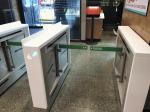Alex Wong/Getty Images
- Amazon is reportedly considering opening up to 3,000 additional cashierless convenience stores.
- Such an expansion of its Amazon Go chain could bring in billions of dollars in new sales, Baird Equity Research analyst Colin Sebastian said in a new note.
- The new stores could prove valuable to the company in other ways too, such as by offering new insights into its customers and by giving it a new product it could offer other retailers, Sebastian said.
Amazon could get a boost worth billions of dollars if it expands its network of cashierless convenience stores.
The company is considering opening some 3,000 Amazon Go stores within the next three years, Bloomberg reported this week. Such a move could allow the company to tap into its existing local delivery system and could provide the company with valuable new data on its customers, said Baird Equity Research analyst Colin Sebastian in a note on Thursday. Perhaps just as importantly, the company could offer the technology behind its Go stores to other retailers and use all the data it collects to improve its various offerings, he said.
"Go provides another potential revenue-generating service offering ... and for Amazon more broadly, this is also a massive data play," Sebastian said.
Go stores allow customers to purchase items, including freshly made meals, without having to interact with a cashier or a cash register. Instead, cameras inside the store track which items customers pick up. Automated turnstiles note when they leave the store and trigger Amazon's computers to tally up their purchases.
The company opened the first Go store to the public in January. Since then, it's opened three more, including one in Chicago this week.
Amazon is mulling a massive expansion of the chain, according to Bloomberg. Its tentative plans call for it to have 10 Go stores open by the end of this year, 50 by the end of next year, and some 3,000 by the end of 2021.
A Go expansion could mean billions of dollars in new salesShould it hit that last target, the stores could bring in about $3 billion to $6 billion in extra revenue for the company, Sebastian estimated. That would translate into about $1 billion to $2.5 billion of gross profit, which is what's left of revenue after subtracting the direct costs of producing or distributing the goods and services a company sells.
Amazon posted $178 billion in sales last year. Its gross profit — which doesn't take into account marketing or other operating costs — was about $41 billion for the year.
The company may not make a bottom-line profit on those sales, though, Sebastian warned. Prices at the company's Go store in Chicago were about 10% to 25% lower than at other convenience stores, he said. Plus the technology needed to power each of the stores could be very pricey. Together, those factors could weigh on net profits or on the company's cash flows during any major expansion of the chain, he said.
But even if the stores themselves aren't immediately profitable, they could provide other opportunities for Amazon, Sebastian said. The company has spent the last several years building out its own delivery service around the country to speed packages from its warehouses to consumers. It could tap into that network and use it to deliver packaged foods from the Go stores to customers, he said. That could help it compete not just with convenience stores such as 7-Eleven, but with a wide range of food delivery services.
"Given that Go expansion will likely focus on urban locations, we believe fast-casual restaurants and meal delivery providers would likely be more impacted than larger grocery retailers," Sebastian said.
The new stores would offer Amazon new data on its customersThe stores will also offer Amazon additional insights into its consumers shopping and purchasing behavior, he said. By observing their shopping habits in its stores, it could learn when they usually get hungry and find out in real-time whether they are sick or tired by what products they pick up off of Go's shelves. That kind of data could allow it to target those customers with promotions more precisely or in a more timely fashion.
"While the Go stores are clearly a step ahead of the 'traditional' retail experience in terms of convenience, we believe they are just as much a data initiative," Sebastian said.
Additionally, the technology underlying the stores could itself eventually become a new product for Amazon to sell. The company could market Go's cashierless system to other retailers and then offer to deliver orders placed online to those retailers via its delivery network.
"We believe that Amazon is in a much better position to leverage cloud computing and [artificial intelligence] than most — if not all — retailers," he said.
As part of his note, Sebastian reiterated his "outperform" rating and $2,100 price target on Amazon's shares. His note came out on the same day the company announced a collection of new products built around its Alexa intelligent assistant technology, including a microwave oven.
The company's stock closed regular trading Thursday up $17.88, or about 1%, to $1,944.30 a share.
NOW WATCH: Everything we know about Samsung’s foldable phone
See Also:
- Amazon came out nowhere to claim the No.3 spot in online advertising — and its game plan should make Google and Facebook afraid
- One Facebook outage shows just how much of our attention the social giant sucks away
- Amazon just accidentally leaked details about 2 new Alexa devices ahead of an event today
SEE ALSO: Banks should be worried about Amazon robbing their business — here's why
SEE ALSO: Amazon has quietly taken a big and fast-growing stake in a $7 trillion market



